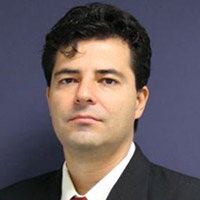
ADOLFO SACHSIDA
PhD in Economics with Post-Doctorate at the University of Alabama. Researcher at the Institute of Applied Economic Research (IPEA).
Former Minister of Mines and Energy.
He has a PhD in Economics from the University of Brasília (2000). He completed his postdoctoral studies with Professor Walter Enders at the University of Alabama, and taught economics at the University of Texas - Pan American (Edinburg). At the invitation of JICA, he visited Japan for an exchange with Japanese experts on macroeconomic modeling. At the invitation of the Friederich Naumann Institute he visited Germany to participate in seminars on economic freedom. Head of the special advisor to the minister of economy. He was Secretary of Economic Policy at the Ministry of Economy. He is also a professor at the Brasiliense Institute of Public Law (IDP). He has experience in the area of Macroeconomics, with an emphasis on Econometric Models. His main area of research concerns the use of econometric models to resolve economic issues. He published several articles nationally and internationally, being, according to Faria et al (2007), one of the most productive Brazilian researchers in the area of economics. He is also a lawyer. He is currently researching: 1) The quality of fiscal and monetary policy in Brazil; 2) Taxation and Tax Reform in Brazil; and 3) Evaluation of Public Policies. He is the author of the books: "Determining Factors of a Nation's Wealth", "Economic, Social and Moral Considerations on Taxation", and "The 2007-09 Crisis: A Liberal Explanation".
Courses he teaches:
Bachelor's DegreeEconomics
Featured works:
LOUREIRO, PRA; MOREIRA, TBS; SACHSIDA, A. Does the effect of media influence suicide rates? Journal of Economic Studies (Bradford), vol. 42, p. 415-432, 2015. Access: https://www.emerald.com/insight/content/doi/10.1108/JES-08-2013-0106/full/html
SACHSIDA, A.; CARNEIRO, FG; LOUREIRO, PR. Does Greater Trade Openness Reduce Inflation? Furhter Evidence Using Panel Data Techniques. Economics Letters, vol. 81, p. 315-319, 2003. Access: https://www.sciencedirect.com/science/article/abs/pii/S0165176503002118



